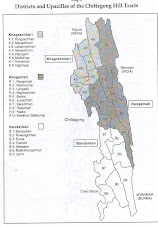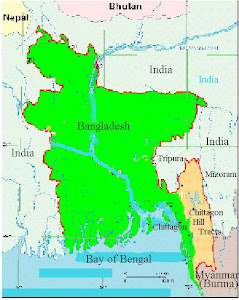Dignity and Justice for All - State of Human Rights of UNPO Members
10 December 2007, The Hague - While welcoming the United Nations’ launch of the campaign to celebrate the 60th Anniversary of the Universal Declaration of Human Rights (UDHR), UNPO takes this opportunity to remind the international community about the poor state of human rights suffered by UNPO Members.
Today the United Nations will launch a year-long campaign of the UDHR with the participation by all parts of the UN family, leading up to 10 December 2008 when the Declaration turns 60. The United Nations has said that the Declaration holds the world record as the most translated document, currently available in more than 360 languages."
The world cannot blindly celebrate the 60th Anniversary of the UDHR with a message of dignity and justice for all without taking concrete actions to end human rights violations on the ground, where it matters the most," stated Mr. Ledum Mitee, President of the UNPO General Assembly.
Over the past year, UNPO Members have been struggling for justice in their respective regions. In Southern Cameroons, for example, an ongoing campaign has taken place for the right to free speech and judicial safeguards, which is regularly violated by the Cameroonian authorities. Following the recent fact-finding mission to Angola, Ms. Asma Jahangir, the UN Special Rapporteur on Freedom of Religion or Belief said that in Cabinda, "a number of religious communities were severely restricted by the authorities in the exercise of the freedom of religion or belief...in some cases violence, threats and intimidation were also used by the Government."
While the nonviolent struggle for democracy in Burma received an overwhelming reaction from the world, a commitment to end widespread human rights abuses is yet to be realised. Within this region of Asia, in Vietnam the Khmer Krom people saw their religious and human rights leaders facing continued prosecution, while Hmong refugees from Laos were confronted with stringent actions at the hands of Thai authorities. Inside Laos Hmong people are hunted down in the jungles by the Laotian military.
On this day, in the streets of The Hague, Amsterdam and other cities throughout the world Uyghurs from Eastern Turkestan will demonstrate to demand genuine religious freedom in present-day China. As for the human rights situation in Tibet, the Dalai Lama recently wrote in The Economists special edition, ‘The World in 2008’ that "Tibetans love their own culture and their way of life, but Chinese officials regard their urge to preserve their identity as a threat to the unity of China."
While the world waits for a final satisfactory solution to the future political status of Kosova, the full implementation of peace accord in the Chittagong Hill Tracts in Bangladesh is again in doubt due to the current political crisis in the country.
With regard to the Naga-India talks, Mr. Rodolfo Stavenhagen, the UN Special Rapporteur on the human rights and fundamental freedoms of indigenous people, in a report to the UN Human Rights Council stated: "Despite the many difficulties, the Nagas favour a peaceful settlement of the conflict and demand full implementation of the 1997 agreement as a precondition to achieve this goal."
Mr. Stavenhagen’s report also stated: “In 2001, Indonesia adopted the Special Autonomy Law No. 21, aiming at finding a solution to West Papua’s political status and to bring peace to the province. Similarly, a Memorandum of Understanding between the Government of Indonesia and the Free Aceh Movement was signed in 2005, providing for a limited autonomy to Aceh within basic sectors of public affairs, as well as for the right to consultation concerning international agreements for special interest to Aceh. While constructive arrangements have been seen as positive steps, the experience of West Papua after more than five years of the entry into force of the autonomy regime is disquieting.”
In a clear violation of the freedom of expression and assembly, West Papuans were banned by Indonesian authorities again this year from raising their flag on 01 December, their national day. Those who defy the ban risk imprisonment, with some individuals currently serving 15 years behind bars. Reports suggest around 20 people were arrested this year for raising the flag, despite international pressure on Indonesia to stop the repression.
Although the United Nations finally adopted the UN Declaration on the Rights of Indigenous Peoples, in Chile seven Mapuche political prisoners have been on hunger strike since 10 October 2007 to protest against their treatment by the government and their health is now in a critical state. These political prisoners were tried under Chile's 1985 "Anti-Terrorism Law."
The death penalty is another human rights crisis faced by numerous UNPO Members. In Iran especially, UNPO Members have suffered under this inhumane punishment, with frequent executions taking place in West Balochistan and Al-Ahwaz for crimes no worse than campaigning for the rights and recognition of minorities within Iran. China has arguably an even worse record regarding the death penalty. Recently, China sentenced five Uyghurs to death on terrorism charges without providing any evidence and refusing to release details of the trial. In both Iran and China, accusations of separatism and terrorism are frequently used to justify the brutal oppression of human rights campaigners.
In Pakistan, political activists have regularly ‘disappeared’, and it is an open secret that these disappearances are carried out by the security services who clamp down on any political dissent. Recent events in Pakistan have confirmed fears that political dissent is not tolerated. Following the imposition of emergency rule, thousands of protesters were arrested for peaceful demonstrations against the undemocratic nature of President Musharraf’s rule.
In Chechnya, while disappearances and extrajudicial killings of Chechens have been a grave unresolved human rights issue, today people live in fear under a totalitarian regime supported by an estimated 30,000 Russian troops present in this republic. Some reports suggest a disturbing figure of up to 70 per cent of unemployment among Chechens.
Despite the overwhelming human rights issues with which UNPO Members are confronted when struggling to safeguard their religious, cultural and national identities, the campaign launched on the importance of the UDHR will be appreciated. During the next year UNPO Members will be encouraged to once again review the 30 Articles of the Declaration in order to create greater awareness on human rights within their communities.
"It will be crucial for human rights victims in UNPO Member regions to deeply understand how their human rights, as recognised by the international human rights laws, are being violated. Through such a realisation, they will understand the human rights dimension of the message ‘dignity and justice for all’," expressed Mr. Marino Busdachin, UNPO General Secretary.
Source from-http://www.unpo.org/article.php?id=7391
skip to main |
skip to sidebar


Map of Bangladesh

CHTs is number one Milliary zone in the world


Ministry of Chittagong Hill Tracts Affairs
The United Nation
The IJPMNA
This page provides information of the minority Indigenous Jumma Peoples in Chittagong Hill Tracts (CHTs) Bangladesh.
Contact with this please write:-ijpnusa@yahoo.com
Contact with this please write:-ijpnusa@yahoo.com
About Us
Location of Jummaland

Jumma Videos
- The BANDARBAN SADAR
- The Rowangchari
- The Ruma
- The Lama
- The Thanchi
- The Alikadom
- The Naikhkhongchari
- The RANGAMATI SADAR
- The Baghaichari
- The Langudu
- The Nanyachar
- The Barkal
- The Jurachari
- The Bilaichari
- The Kaptai
- The Rajsthali
- The Kawkhali
- The KHAGRACHARI SADAR
- The Manikchari
- The Laksmichari
- The Mahalchari
- The Matiranga
- The Ramgarh
- The Dighinala
- The Panchari
Audio & Video
Jumma Natok (Drama)
International Support
Educational Institution
Religious Organization
Buddhist Studies

Map of Bangladesh
Mission of Bangladesh
About Bangladesh
Bangali Audio Songs
Bengali News

CHTs is number one Milliary zone in the world
Online Audios
Refugee in Homeland

Jumma Picture

Blog Archive
About Me
- The Indigenous Jumma Peoples Movement in North America
- The Chittagong Hill Tracts (CHT) region comprises three districts: Banderban , Khagrachari and Rangamati. The districts comprise seven main valleys formed by the Feni, Karnafuli, Chengi, Myani, Kassalong, Sangu and Matamuhuri rivers aid their tributaries and numerous hills, ravines and cliffs covered with dense vegetation, which are in complete contrast to most other districts of Bangladesh, which consist mainly of alluvial lands. Geographically the CHT can be divided into two broad ecological zones: (a) hill valley, (b) agricultural plains. It is surrounded by the Indian states of Tripura on the north and Mizoram on the east, Myanmar on the south and east and Chittagong district on the west.
